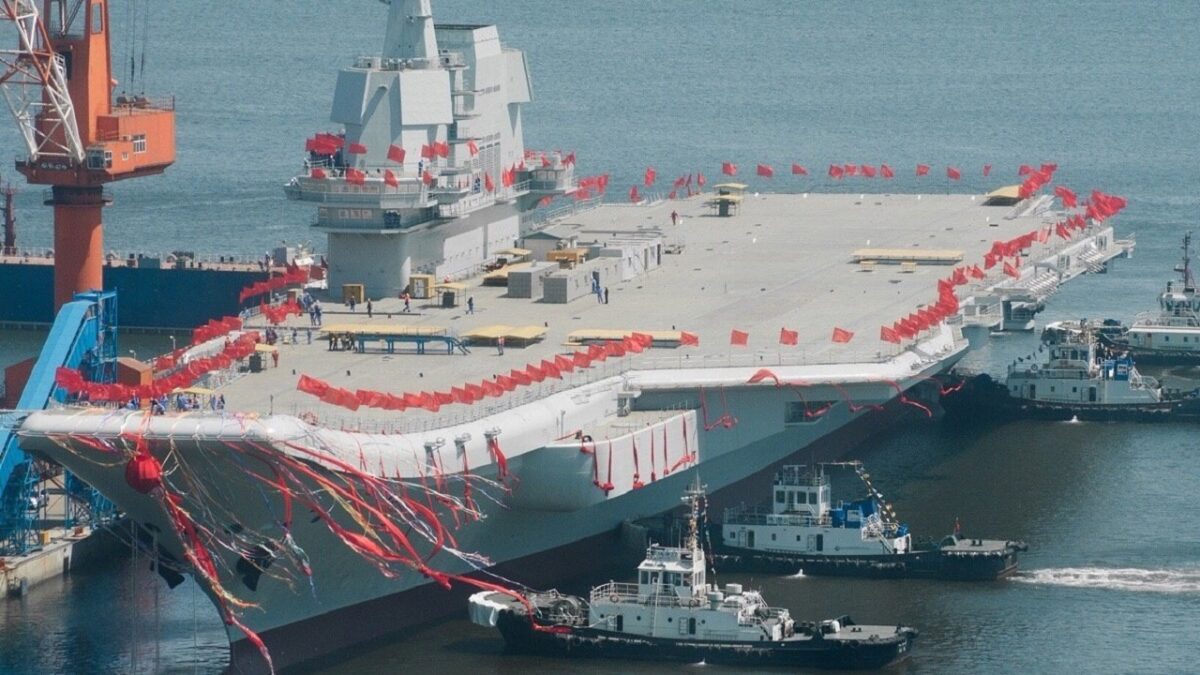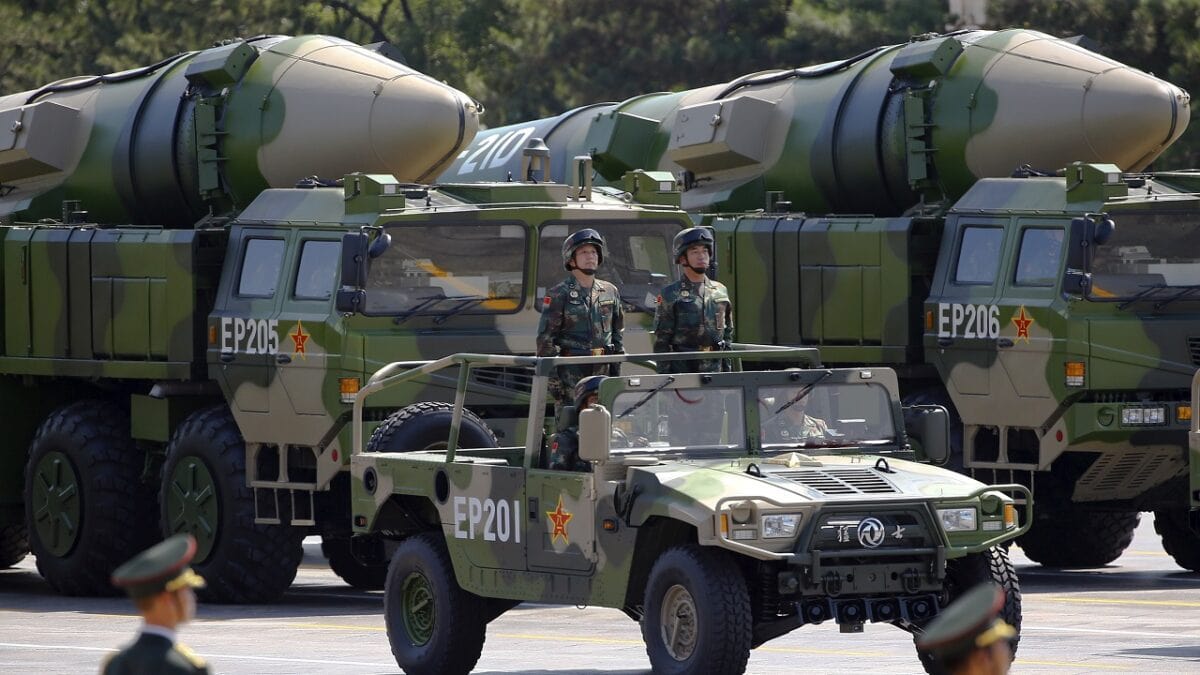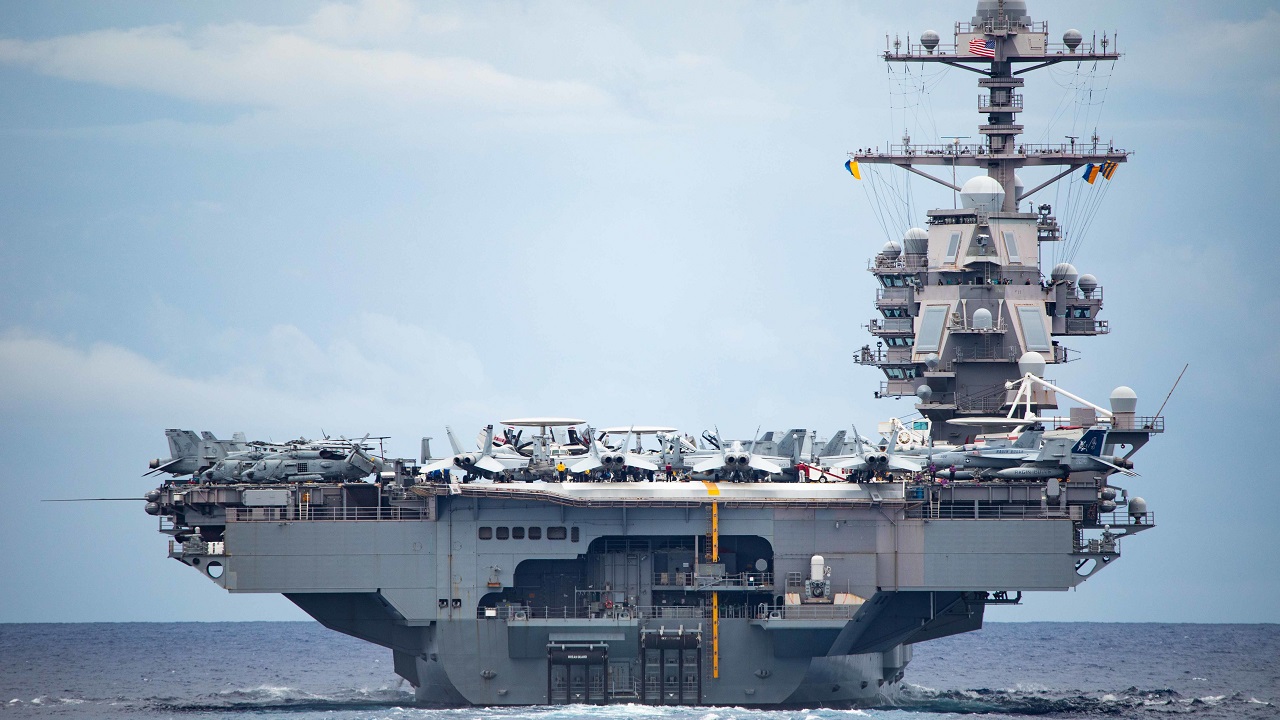China and U.S. Have Entered the Danger Zone Says Dr. James Holmes: This week Wisconsin congressman Mike Gallagher delivered a brusque speech at the Washington, DC-based Heritage Foundation sounding the alarm klaxon about the state of the U.S. armed forces. Occasioning his remarks was the release of the annual Heritage Index of U.S. Military Strength, which rates the services’ capability and capacity to discharge the missions entrusted to them.
This year, for the first time, the report’s coauthors adjudged the armed forces “weak” relative to commitments set before them in such embattled theaters as the Western Pacific. Representative Gallagher ascribed the United States’ martial plight to a nexus of a worsening strategic environment, policy drift in Washington, and the Pentagon’s efforts to recapitalize the joint force after its post-Cold War strategic holiday and years of counterinsurgent warfare.
As he sees it, the seascape has turned hostile in the Pacific for a variety of reasons foreign and domestic.
Time is the crucial factor for Gallagher, and it’s hard to gainsay his analysis. Although he didn’t use the term at Heritage, he believes the United States has entered into a “danger zone” in its strategic competition against Communist China. A danger zone is an interval when a competitor sees an opportunity to resolve some strategic quandary in its favor, usually by force of arms. And it’s a finite interval. Such a competitor estimates that trendlines—in military power, economic growth, demographics, whatever—will soon turn against it.
In other words, it regards opportunity as fleeting. A competitor contemplating a danger zone believes it’s on a deadline. It must act now or never. Its leadership finds itself tempted to do something bold, even courting stark peril, before timebound opportunity slips away.
The situation in the Western Pacific today echoes the situation in imperial Germany a century-plus ago, when Admiral Alfred von Tirpitz, the state secretary for the navy, informed Kaiser Wilhelm II that the fast-growing German navy would have to traverse a “danger zone” relative to Great Britain and its Royal Navy, the natural foe of German sea power.
By that, he meant that British leaders might act to forestall the rise of a strategic competitor across the North Sea. Danger-zone logic might prompt them to order a preemptive assault on the High Seas Fleet, the capital-ship armada Tirpitz and Wilhelm had willed into being, while the fleet remained under construction. And thus before it could mature into a mortal challenge to British saltwater supremacy.
While the situation in today’s Western Pacific echoes with fin de siècle Western Europe, the echo is distorted. Then, an established maritime power, Britain, was tempted to use force to thwart an emerging rival, Germany. Today, an emerging maritime power, China, is tempted to use force before America, a long-established maritime power in decline, can regain its standing as an oceangoing hegemon. But in both cases, one competitor was in a hurry because of how its leadership sized up the geostrategic setting.
Now, Great Britain navigated the danger zone by running a successful naval arms race with imperial Germany. It never relinquished its lead by most metrics of seaborne combat power, including the all-important tally of armored dreadnought battleships. If Gallagher and the Heritage team are correct, the United States has surrendered its advantage at sea through neglect. It needs time as well as political resolve to stage a come-from-behind campaign to resume its customary superiority over China’s People’s Liberation Army (PLA).
How to buy time? Not through the British method of accelerating naval construction to keep ahead of a burgeoning challenger. That option is lost. In fact, Gallagher observes that the U.S. Navy, far from swelling in numbers and firepower to meet the China challenge, is set to decline in numbers from today’s 292 battle-force ships to 280 in the coming years as it discards aged or supposedly less-than-useful hulls. This at a time when Congress has mandated a 355-ship inventory and uniformed navy magnates say the nation needs a fleet exceeding 500 crewed and uncrewed vessels to accomplish its goals in the world.

Fujian, China’s new aircraft carrier. Image Credit: Chinese Internet.
The trough in fleet numbers yawns before the American fleet at a time when China—which may see the strategic surroundings turning against it—feels impelled to settle longstanding grudges, in the Taiwan Strait in particular, to communist leaders’ satisfaction. Gallagher makes much of the “Davidson Window,” named for Admiral Phil Davidson, the former U.S. Indo-Pacific Command chief who last year prophesied that China might strike against Taiwan by 2027.
If Davidson has it right, Beijing has set itself a five-year deadline at a time when its military prowess stands at its zenith and Washington finds itself struggling to rebuild its own naval and military machine. That’s its window of opportunity—and a quintessential danger zone.
But all is not lost. While the U.S. Navy and affiliated joint forces replenish their strength, Gallagher urged the Pentagon to construct an “anti-navy.” That’s a term of novel coinage, but the underlying concept is far from new. Before World War I the British marine historian and theorist Sir Julian Corbett outlined a strategic option known as “active defense,” whereby a nautical competitor that finds itself at a temporary disadvantage plays for time until it can amass superior combat power to outmatch its foe.
He prescribed an interim solution. If a competitor—the Royal Navy in the days of Corbett, or the U.S. Navy today—can’t yet win a naval war outright, it can fashion a “sea denial” force to deny its opponent the blessings of maritime command. Gallagher’s anti-navy is Corbett’s “flotilla,” a swarm of superempowered small craft able to prevent a hostile force from controlling important seaways. But as Gallagher notes, in this age of long-range precision firepower a flotilla need not be a contingent of ships. U.S. Marine, Army, and Air Force units operating from land can radiate power far out to sea—helping confound aggression against Taiwan or elsewhere along China’s nautical ramparts.
An anti-navy can fight from dry earth.

Military vehicles carrying DF-21D ballistic missiles roll to Tiananmen Square during a military parade to mark the 70th anniversary of the end of World War Two, in Beijing, China, September 3, 2015. REUTERS/Damir Sagolj
Precision-guided missiles stationed throughout the Pacific could menace the PLA Navy, denying it the marine supremacy it must possess to invade Taiwan. Gallagher envisions emplacing missile-armed units in three rings centered on continental Asia. Namely, along the first island chain and second island chain, and at more remote locations such as Alaska or Hawaii. If a U.S. (and allied) anti-navy can prevent Chinese amphibian forces from landing on Taiwan, it can balk Chinese strategy. And frustrating an antagonist’s strategy constitutes the gold standard for strategic efficacy.
Once the U.S. Navy has rebuilt its numbers and harnessed newfangled technology, presumably in the 2030s, it can reassert command of the sea. Deny command, win command, exploit command. That’s the Corbettian way. It’s how the temporarily weak win.
(Join Our FREE Newsletter Here.)
The only quibble I have with Gallagher’s strategic prescription is that the United States and its allies should also field a seagoing adjunct to land-based missiles and warplanes. A flotilla of winsome, low-cost, missile-armed surface combatants and diesel submarines could dish out punishment while helping the extended, land-based sea-denial force arrayed around the Pacific detect, track, and target hostile warships and aircraft. Allies such as Japan already operate such forces in modest numbers; the United States should follow their lead.
An anti-navy, then, can and should rest in part on a naval contingent—as Julian Corbett might say were he among the quick today. Such a composite joint force would underwrite a formidable active defense, helping America, its allies, and its friends cross through the danger zone without war. The Pentagon would be wise to heed Corbett’s—and Gallagher’s—counsel.
Pronto.
Dr. James Holmes is J. C. Wylie Chair of Maritime Strategy at the Naval War College and a Nonresident Fellow at the Brute Krulak Center for Innovation & Future Warfare, Marine Corps University. The views voiced here are his alone. He is a 19FortyFive Contributing Editor.

